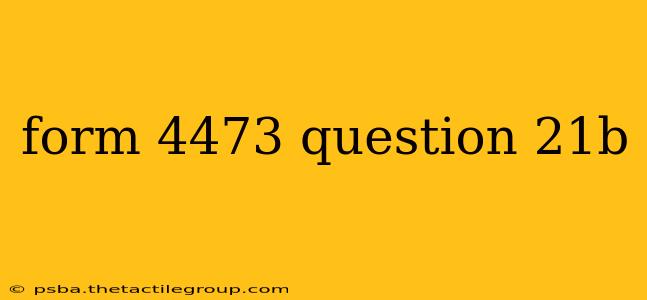The Bureau of Alcohol, Tobacco, Firearms and Explosives (ATF) Form 4473 is a crucial document in the process of purchasing firearms in the United States. One of the most scrutinized questions on this form is Question 21b, which delves into the buyer's history of mental health adjudications. Understanding this question is vital for both firearm retailers and prospective buyers to ensure compliance with federal law.
What is Question 21b on ATF Form 4473?
Question 21b on the ATF Form 4473 asks: "Have you ever been adjudicated mentally defective or been committed to a mental institution?" This question directly addresses a key provision of the Gun Control Act of 1968, which prohibits certain individuals with mental health histories from possessing firearms.
Key Terms Defined:
-
Adjudicated Mentally Defective: This refers to a legal determination by a court or other competent authority that an individual is mentally incompetent or incapable of managing their affairs. This isn't simply a diagnosis from a mental health professional; it requires a formal legal ruling.
-
Committed to a Mental Institution: This refers to involuntary commitment to a mental institution. Voluntary commitment, where an individual seeks treatment willingly, does not typically disqualify someone from firearm ownership. The commitment must be a result of a legal process indicating a danger to oneself or others.
Interpreting the Question: Nuances and Implications
The wording of Question 21b is crucial. A simple "yes" or "no" answer doesn't always encompass the complexities of mental health history. For example:
-
Past Treatment vs. Adjudication: Receiving mental health treatment does not automatically disqualify a person from firearm ownership. The key is whether a court formally adjudicated them as mentally defective or involuntarily committed them.
-
State Variations: Laws regarding mental health adjudications and commitments can vary between states. What constitutes "adjudicated mentally defective" might differ subtly, leading to potential confusion.
-
Expungement or Restoration of Rights: In some cases, individuals may have had their mental health records expunged or their rights restored. This impacts their answer to Question 21b. If rights are restored, the answer might be "no," while a prior adjudication remains part of their history.
Consequences of False Answers
Providing a false answer to Question 21b carries severe legal ramifications. A knowingly false statement on the ATF Form 4473 constitutes a federal felony offense, punishable by significant prison time and substantial fines. This underscores the critical importance of honesty and accuracy when completing this form.
Seeking Clarification: When in Doubt
If a prospective buyer is unsure how to answer Question 21b due to a complex or nuanced mental health history, they should seek legal counsel before completing the form. It is always better to err on the side of caution and obtain professional advice to ensure compliance with the law and avoid potential legal repercussions.
Conclusion
Question 21b on the ATF Form 4473 is a critical component of the firearm purchasing process. Understanding the legal definitions, the nuances of mental health adjudications, and the potential consequences of providing inaccurate information is paramount for both firearm retailers and individuals seeking to purchase firearms. When in doubt, seeking professional legal advice is strongly recommended. This comprehensive guide aims to provide clarity but does not constitute legal advice; consult with legal professionals for specific guidance regarding your individual circumstances.

